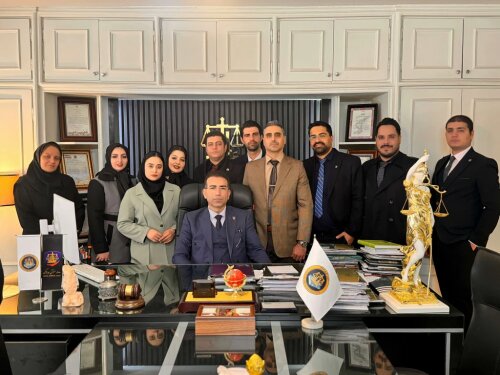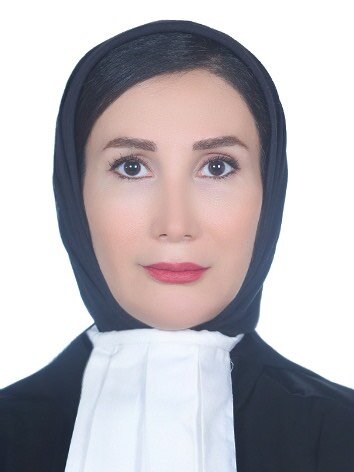Best Military Divorce Lawyers in Iran
Share your needs with us, get contacted by law firms.
Free. Takes 2 min.
Free Guide to Hiring a Family Lawyer
Or refine your search by selecting a city:
List of the best lawyers in Iran
About Military Divorce Law in Iran
Iranian law recognizes military divorce as a separate category from civilian divorce. Military divorce cases are handled by specialized military courts, and specific laws and regulations apply in these situations.
Why You May Need a Lawyer
Legal representation is essential in military divorce cases to ensure your rights are protected and to navigate the complexities of military law. A lawyer can help you understand your options, negotiate on your behalf, and advocate for your best interests in court.
Local Laws Overview
In Iran, military divorce laws may differ from civilian divorce laws. Military personnel may be subject to specific regulations governing divorce, including timelines, division of assets, and child custody arrangements. It is crucial to consult with a knowledgeable attorney familiar with military divorce law in Iran.
Frequently Asked Questions
Q: How is military divorce different from civilian divorce in Iran?
A: Military divorce in Iran is governed by specific laws applicable to military personnel and may involve additional considerations such as pensions, benefits, and jurisdiction of military courts.
Q: Can a civilian lawyer represent me in a military divorce case?
A: It is recommended to seek legal assistance from a lawyer experienced in military divorce cases to ensure your case is handled correctly within the military court system.
Q: What factors are considered in child custody cases in military divorce?
A: Child custody decisions in military divorce cases are based on the best interests of the child, taking into account factors such as stability, relationships with parents, and the child's preferences (if age-appropriate).
Q: How is property divided in military divorce cases?
A: Division of assets in military divorce cases follows the principles of equitable distribution, where courts aim to divide marital property fairly but not necessarily equally between spouses.
Q: How long does a military divorce case typically take?
A: The timeline for a military divorce case can vary depending on factors such as the complexity of the case, cooperation between parties, and court backlog. It is best to consult with a lawyer for an estimate based on your specific circumstances.
Q: Can I receive spousal support in a military divorce?
A: Spousal support, also known as alimony, may be awarded in military divorce cases based on factors such as the length of the marriage, financial need, and the earning capacity of each spouse.
Q: What rights do military personnel have in divorce proceedings?
A: Military personnel have specific rights and protections under the Servicemembers Civil Relief Act (SCRA) that may impact divorce proceedings. It is essential to consult with a lawyer knowledgeable about military law to understand these rights fully.
Q: Can I modify a military divorce settlement after it is finalized?
A: Modifications to a military divorce settlement may be possible in certain circumstances, such as changes in financial or family situations. It is advisable to consult with a lawyer to evaluate your options for seeking modifications.
Q: Can I file for a military divorce while stationed overseas?
A: Military personnel stationed overseas can initiate divorce proceedings in Iran under certain conditions. It is advisable to consult with a lawyer for guidance on filing for divorce while abroad.
Q: How can I find a lawyer experienced in military divorce cases in Iran?
A: You can seek referrals from legal organizations, military legal assistance offices, or online directories to find a lawyer with expertise in military divorce law. It is essential to research and interview potential attorneys to find the best fit for your case.
Additional Resources
For more information on military divorce in Iran, you can contact the Iranian Military Legal Office or the Iranian Bar Association. These organizations can provide resources, referrals, and assistance in navigating military divorce law.
Next Steps
If you are considering or going through a military divorce in Iran, it is crucial to seek legal advice from an experienced attorney specializing in military law. Consult with a lawyer to understand your rights, options, and the steps necessary to protect your interests in a military divorce case.
Lawzana helps you find the best lawyers and law firms in Iran through a curated and pre-screened list of qualified legal professionals. Our platform offers rankings and detailed profiles of attorneys and law firms, allowing you to compare based on practice areas, including Military Divorce, experience, and client feedback.
Each profile includes a description of the firm's areas of practice, client reviews, team members and partners, year of establishment, spoken languages, office locations, contact information, social media presence, and any published articles or resources. Most firms on our platform speak English and are experienced in both local and international legal matters.
Get a quote from top-rated law firms in Iran — quickly, securely, and without unnecessary hassle.
Disclaimer:
The information provided on this page is for general informational purposes only and does not constitute legal advice. While we strive to ensure the accuracy and relevance of the content, legal information may change over time, and interpretations of the law can vary. You should always consult with a qualified legal professional for advice specific to your situation.
We disclaim all liability for actions taken or not taken based on the content of this page. If you believe any information is incorrect or outdated, please contact us, and we will review and update it where appropriate.
Browse military divorce law firms by city in Iran
Refine your search by selecting a city.
















